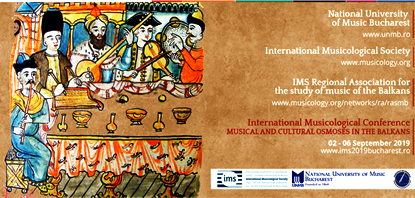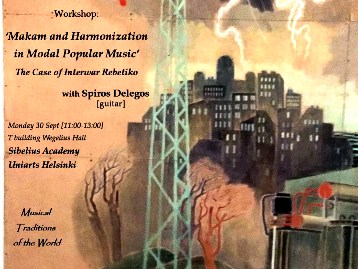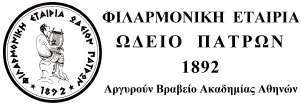 Ο καθηγητής του τμήματος Αστικής Λαϊκής Μουσικής της Φιλαρμονικής Εταιρίας Ωδείο Πατρών Σπύρος Δελέγκος μέσα στο μήνα Σεπτέμβριο συμμετείχε με διάλεξη σε Μουσικολογικό Συνέδριο στο Βουκουρέστι και με Workshop στη Μουσική Ακαδημία Sibelius στο Ελσίνκι.
Ο καθηγητής του τμήματος Αστικής Λαϊκής Μουσικής της Φιλαρμονικής Εταιρίας Ωδείο Πατρών Σπύρος Δελέγκος μέσα στο μήνα Σεπτέμβριο συμμετείχε με διάλεξη σε Μουσικολογικό Συνέδριο στο Βουκουρέστι και με Workshop στη Μουσική Ακαδημία Sibelius στο Ελσίνκι.
Στα πλαίσια του διεθνούς μουσικολογικού συνεδρίου "Musical and Cultural Osmoses in the Balkans" από τον παγκόσμιο μουσικολογικό σύνδεσμο IMS (RASMB) που διεξάχθηκε στο Εθνικό Πανεπιστήμιο Μουσικής του Βουκουρεστίου της Ρουμανίας από τις 2 ως τις 6 Σεπτεμβρίου 2019, o καθηγητής της Φιλαρμονικής Εταιρίας Ωδείο Πατρών Σπύρος Δελέγκος, με την ιδιότητα του εθνομουσικολόγου, έδωσε στην Αγγλική γλώσσα τη διάλεξη με τίτλο "‘Equal Tempered Makam’: Change and Continuity in Ottoman Popular Makam. The case of Rebetiko during the Interwar Period."
Η περίληψη της διάλεξης:
Equal Tempered Makam:
Change and Continuity in Ottoman Popular Makam: The Case of
Rebetiko during the Interwar Period.
The current paper addresses the bridging of two theoretically contrary concepts in research discourses: makam and equal temperament in the Greek Rebetiko musical culture from a perspective of historical ethnomusicology.
The phenomenon meanders between the Ottoman makam in its popular version and the European twelve-tone equal temperament; this idiosyncratic musical cultural expression could broadly be considered as osmosis in the Balkan and the Eastern Mediterranean context. In this regard, Rebetiko performance practice, which belongs to the world of orality, transcends the above theoretical incompatibility inducing the deconstruction of the typical static dipole theory – practice and leading to the introduction of the term “equal tempered makam”. It constitutes a secondary form of makam of syncretic character showing its continuity and its modernized version in the new context of Rebetiko based on the equal tempered three-course bouzouki.
During the Interwar period, Rebetiko is one of the well-known music genres of the Greek urban popular music. The latter, as an umbrella term, embraces a plethora of instrumental tunes and songs of mixed origin and rich in style and morphology; those flourished in the large urban centres of the greater Greek area and the Ottoman Empire (Athens, Piraeus, Constantinople, Smyrna/Izmir, Salonika etc.) from the 19th century and onwards.
After listening to a large corpus of gramophone recordings of the Interwar period, certain representative music pieces are chosen firstly in order to be documented in transcriptions and secondly to be analyzed, co-examined and interpreted within the socio-cultural context. The recordings are regarded as primary elements of the examined musical culture. The above procedure reveals the change and the continuity in the Ottoman popular makam within Rebetiko musical culture shedding light on this peculiar syncretic phenomenon and introducing as well one of the resonant aspects of the ideologically polysemous notions of Balkanism and Mediterraneanism. Στη μουσική ακαδημία "Sibelius Academy" του πανεπιστημίου Τεχνών του Ελσίνκι ("Uniarts Helsinki"), τη Δευτέρα στις 30 Σεπτεμβρίου πραγματοποιήθηκε από τον Σπύρο Δελέγκο με κιθάρα, καθηγητή της Φιλαρμονικής Εταιρίας Ωδείο Πατρών, το μουσικό εργαστήρι (workshop) 'Makam and Harmonization in Modal Popular Music. The Case of Interwar Rebetiko'. («Μακάμ και εναρμόνιση στις τροπικές λαϊκές μουσικές. Η περίπτωση του Μεσοπολεμικού Ρεμπέτικου»)
Στη μουσική ακαδημία "Sibelius Academy" του πανεπιστημίου Τεχνών του Ελσίνκι ("Uniarts Helsinki"), τη Δευτέρα στις 30 Σεπτεμβρίου πραγματοποιήθηκε από τον Σπύρο Δελέγκο με κιθάρα, καθηγητή της Φιλαρμονικής Εταιρίας Ωδείο Πατρών, το μουσικό εργαστήρι (workshop) 'Makam and Harmonization in Modal Popular Music. The Case of Interwar Rebetiko'. («Μακάμ και εναρμόνιση στις τροπικές λαϊκές μουσικές. Η περίπτωση του Μεσοπολεμικού Ρεμπέτικου»)
Το workshop απευθυνόταν στους δευτεροετείς και τριτοετείς φοιτητές του πανεπιστημίου στο πλαίσιο του μαθήματος ‘Musical traditions of the world’ («Μουσικές παραδόσεις του κόσμου») του τμήματος ‘Folk Music Department’ (πρόγραμμα ‘Global Music’) της ανωτέρω πανεπιστημιακής μουσικής ακαδημίας.
Workshop:
'Makam and Harmonization in Modal Popular Music.
The Case of Interwar Rebetiko'
with Spiros Delegos [guitar]
Monday 30 Sept [11:00-13:00], T building Wegelius Hall,
Sibelius Academy Uniarts Helsinki
The current workshop is an immersion in two key concepts concerning the Interwar Rebetiko, a genre which falls into the category of modal popular music:
1) Makam as an expression of the Eastern Mediterranean and the Balkan modality. The focus is on the continuity of Ottoman popular makam, mostly in its equal-tempered form, within the Rebetiko context.
2) Harmonization, as an expression of innovative musical practice in makam melodies in a ‘traditional’ way without obeying, to an extent, the conventional rules of ‘Western’ Theory.
The above can be comprehended by the participants through the collective performance of representative Rebetiko musical pieces and their relevant analysis. Improvisation will be the closing objective of the workshop as an experiential process.
The workshop is open to all vocalists and instrumentalists regardless of their instruments.
Στο πλαίσιο των ομιλιών που διεξήχθηκαν κατά το φεστιβάλ ‘Greek Blues: REBETIKO FESTIVAL in HELSINKI’ στις 29 Σεπτεμβρίου στο Ελσίνκι της Φινλανδίας, ο καθηγητής της Φιλαρμονικής Εταιρίας Ωδείο Πατρών Σπύρος Δελέγκος, με την ιδιότητα του εθνομουσικολόγου, έδωσε στην Αγγλική γλώσσα τη διάλεξη με τίτλο 'Rebetiko’: Musicο-Cultural Trajectories within the Eastern Mediterranean and the Balkans [«Ρεμπέτικο: Μουσικοπολιτισμικές διαδρομές μέσα στην Ανατολική Μεσόγειο και τα Βαλκάνια»]. Η διοργάνωση άνηκε στον Ελληνο-Φινλανδικό σύνδεσμο που εδράζεται στο Ελσίνκι.
Η περίληψη της ομιλίας:
"Rebetiko’: Musicο-Cultural Trajectories within the Eastern Mediterranean and the Balkans"
The current talk attempts to trace briefly the musicο-cultural trajectories within the powerful and cosmopolitan urban network of the eastern Mediterranean and the Balkans, which lead to the formulation of Rebetiko musical culture.
During the interwar period, Rebetiko was one of the most known musical genres of Greek urban popular music. The latter, as an umbrella term, embraces a plethora of instrumental tunes and songs of mixed origin and rich in style and morphology; these flourished in the large urban centres of the greater Greek area and the Ottoman Empire (Athens, Piraeus, Istanbul, Smyrna, Salonika, etc.) from the 19th century onwards.
Nonetheless, it should be clarified that ‘Rebetiko’ is quite a broad and obscure term; this is so not just from a scholar perspective, but from the several different views in everyday life regarding its content and the unclear time of its birth and demise, too.
Spiros Delegos
musician-ethnomusicologist

